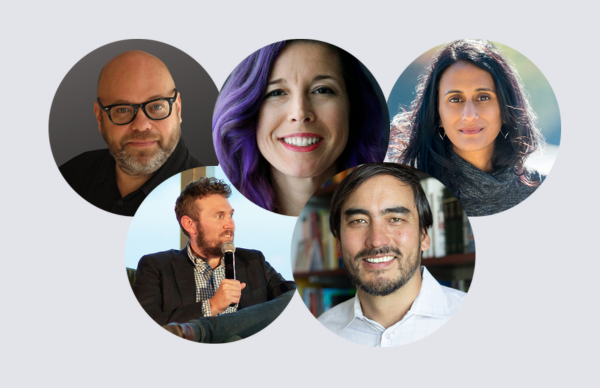
From Chat GPT to deepfake technology, artificial intelligence and machine learning are the future. Our expert speakers are at the forefront in the conversation about this rapid extraordinary technology revolution. In their riveting keynotes, they bring insights to corporations and organizations on what these trends and advancements mean for society and its future.
Kashmir Hill
The Rise of AI and the End of Anonymity
Powerful facial recognition, combined with artificial intelligence and an internet full of our pictures, means that it is now easy not just to put a name to a face, but also to link a person to their digital dossier and private information. As individuals, governments, and businesses increasingly adopt AI-based technology, it will present privacy challenges, but also opportunities. In her talks, Kashmir Hill helps audiences prepare for that future, and explains how the lessons we have learned from the adoption of facial recognition are a preview of what will happen with generative AI.
Read More: Barred From Grocery Stores by Facial Recognition | The New York Times
Adam Davidson
AI and the Future of Work and Business
Adam Davidson is an expert at demystifying complex topics, and he applies these skills to the most crucial issue of our time: the rise of AI. His talk is geared towards curious laypeople—from college students to business decision-makers—who know that AI is likely to transform their careers and business and need a clear framework to understand this new revolutionary technology. AI, he explains, will create massive new winners and, yes, a bunch of losers, as it rewrites our economic rules.
Read More: How the job market works and which jobs get replaced by robots | NPR
Tim Wu
President Biden’s former tech advisor and an influential voice in discussions around tech regulation, Tim Wu refocuses the conversation on AI from the abstract risks posed by the tools to the actual harms that are already occurring, and the failure to regulate Silicon Valley’s most powerful companies. In his perceptive talks, Wu addresses concerns about the dystopian future and how to create policies that would spur broader innovation and computer-human cooperation.
Read More: Biden’s former tech adviser on what Washington is missing about AI | The Washington Post
Bina Venkataraman

AI Ghosts: Deepfake Recreations
Bina Venkataraman leads discussions about the impact deepfake technology will have, from the promise of future “live” musical performances from the dead to tools that would make AI apparitions out of decreased loved ones. She predicts the role that this “grief tech” will play in the future, and offers insightful perspectives on the pros and cons.
Read More: AI ghosts are coming. But must we perform from beyond the grave? | The Washington Post
Charlie Warzel

Workplace AI
“Workplace AI feels like the purest distillation of a corrosive ideology that demands frictionless productivity from workers: The easier our labor becomes, the more of it we can do, and the more of it we’ll be expected to do.” In his keynotes, Charlie Warzel explains how AI would affect how we do our jobs (and it’s not total job replacement) and helps audiences make sense of our digital moment and how it affects our lives.
Read More: Here’s How AI Will Come for Your Job | The Atlantic


